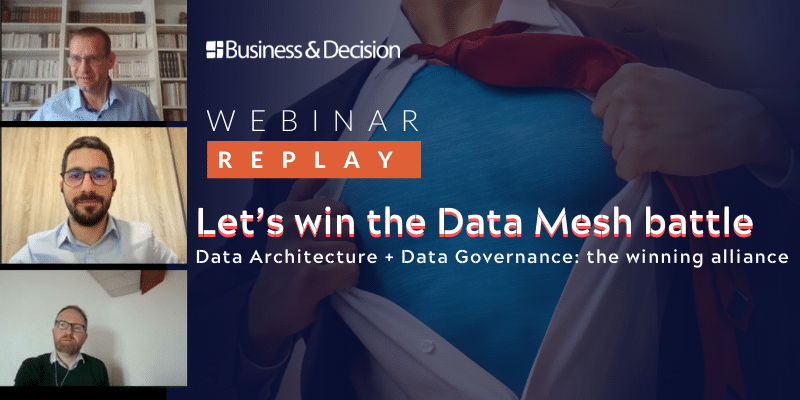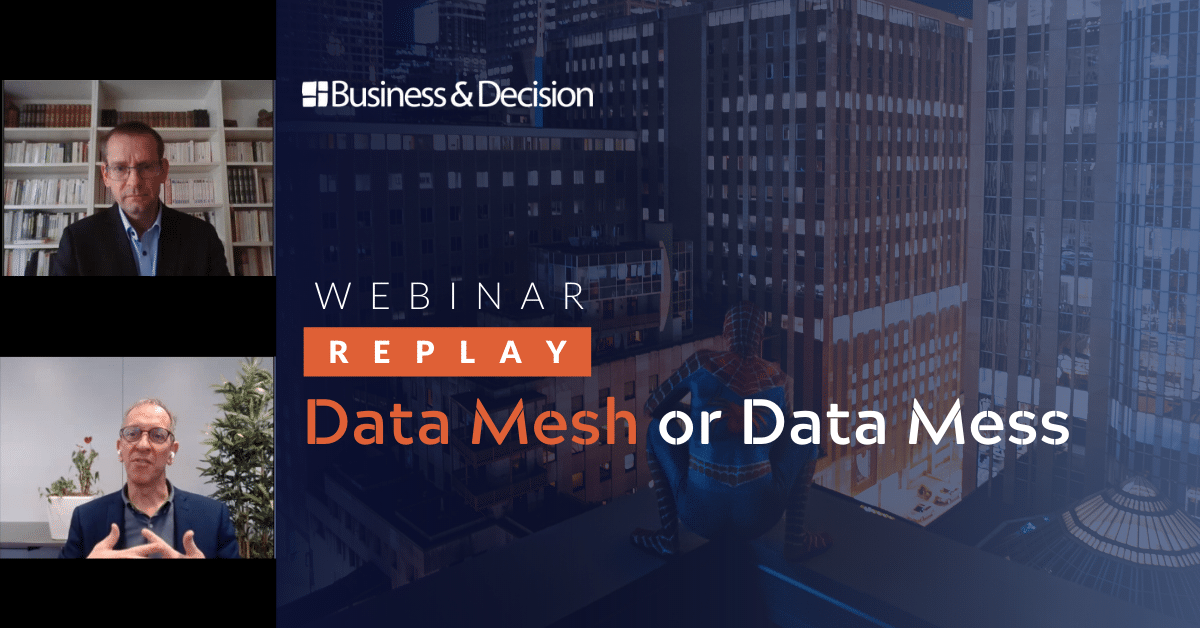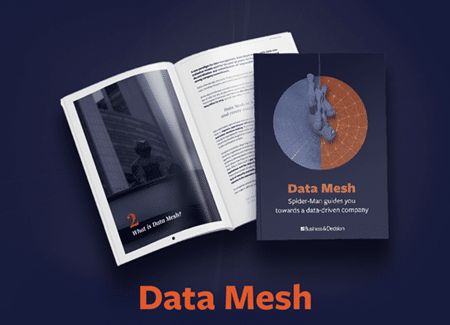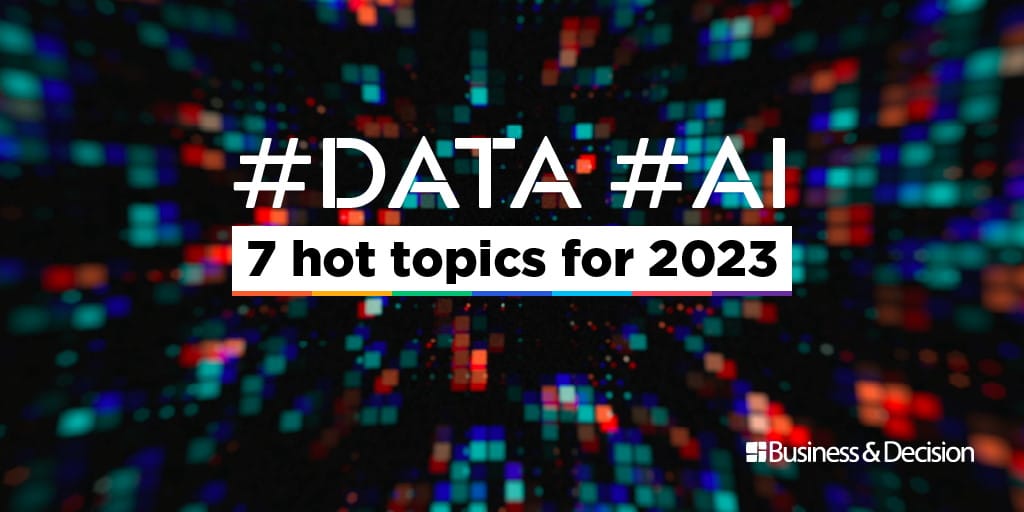More & more industries starts to implement Artificial Intelligence projects into their businesses to optimize their processes and efficiency. But how to see positive return on investment from their AI projects?

Transform your organisation for a better human-machine collaboration
Our Business & Decision Expert Podcast strive to answer business questions in the domain of Data & Digital for your company’s digital transformation. For this episode, our experts will discuss about the impact of Artificial Intelligence on Customer Engagement.
What we will discuss in this podcast episode:
- What are the opportunities for companies to use Artificial Intelligence?
- Does our digital marketing will have a more AI-driven approach in the future?
- To what extent can we use neurotechnologies for companies? (consumer research, marketing, process analysis etc…)
Bjorn Andelhofs, Business & Decision Marketing Officer is joined by experts from Celebrium X, a company specialized in using Nanotechnologies for this podcast episode:
- Anna Kamenskaya, Chief Business Developer and Officer at Celebrium Labs
- Ivan Bezdenezhnykh, Research Director, at Celebrium X
- Carlo Schots, Business & Decision Sales Director
- Yves Van Den Brande, Lead for Customer Engagement at Business & Decision
Listen to the full podcast:
Carlo: (…) In terms of excellence, a good example could be manufacturing excellence. How can ROI help companies increasing the uptime of their production capacity is one. We see there a concrete challenge and that in industry, a lot of knowledge about manufacturing systems isn’t in the hands of people. And it’s a fact that in in Europe, a lot of people will leave those companies because they will be retired in two or three years. So they are really facing with these challenges there. And I believe that the AI, machine learning will truly help gathering and write models to replace decisions in a more automated way with the goal to improve the ROI and availability of their production systems. And that could be one or another one is a everything about smart products. So as you know, in the introduction, I worked in the IoT space. So the opportunity we have there is that we collect a lot of information on top of transactional information, social information people. So a good example is what Google is doing with the Nest thermostat, it helps improving your energy bills, because it will behave based on the data it collects when you are at home, when you like an atmosphere that is warmer than when you’re not at home. So it will learn and assist the consumer in that.
But also, when it comes up to customer services, and customer operations, companies today are striving to optimize their costs on the customer patient sides, while having an optimal customer experience and customer satisfaction. And I would like to refer to another common discussion we had in the previous podcast regarding human contact luxury. Well, I think that human contact can still be luxury for specific cases where you really require human interaction, and that the machine can take it over and predict what kind of service request you will get. What’s the mood of the person calling in and so on. To give him an an ideal customer experience. It could be that it’s a chatbot that is answering. But in some cases, it would be more ideal to route for example, an incoming call to a physical person, and that can pay attention and give him more human touch to the conversation. So these are some some other use cases, I’m thinking about where AI could really help improving the ROI for companies and delivering more value in terms of customer satisfaction as well.
Bjorn: Okay, thanks. Well, you you mentioned customer experience a couple of times, so I don’t know me, maybe if you have something to add as our as our expert.
Yves: Sweet pleasure. And there is an enormous AI wave going on in the in the world of customer engagement. You know, to give a bit of context, customer engagement is really a lot about making personalized offers personalized recommendations, and so on. Traditional this was often by rule based systems where you say “okay, if a customer has been looking three times at a certain product, then I’m going to trigger personalization flow one, two or three.” Now, as also Ivan was mentioning, in the introduction, there is more and more and more data available. And in a big data world, it’s actually too complicated to try to grasp all the scenarios in predefined tools. So we’ve seen that in high volume industries. We are guiding our customers to replace this more rule based marketing to a AI driven marketing approach. Have a sequence of AI algorithms that is analyzing the all data that is captured and trying to find out: “Okay, what is now the most relevant product to offer? What is the most valuable product to offer? What is the most relevant channel to address this personalized the next best offer to a customer?” So that is a wave that is really happening at this point in time.
Yves: In addition, what you also see is that AI more and more is becoming embedded out of the box in technologies. It’s becoming a bit out of the box in personalization engines in journey, orchestration tools, and so on. And we’re a couple of years ago, only the leaders were using algorithms like collaborative filtering, for offering similar products and things like that. All these algorithms now has been enabled, more and more out of the box. So the key question is, what is the next level of competitive differentiation with technology because in a couple of years, every party will be doing more or less the same order using more or less the same algorithms. If you take a look what the big analysts are saying, like Gartner, and that’s why I was so enthusiastic about this podcast is what Gartner is predicting is the next level of competing with AI will be much more into the area of emotional and behavioral AI, like algorithms that are picking up, for example, what is the rate at two bits at which somebody is typing? Is it going faster, going slower, what is the the tone of voice, and so on, and then try to use that insight to steer a dialogue or a next best offer, or wait a bit with a certain offer? Because you might detect that there is some friction. That is, I think what we could expect in the coming years, we see some initiatives already in there, especially in the area of contact centers, and like real time sentiment analysis. But it is still first cases because we have the there are some challenges. There’s the aspect of language, but also and perhaps also very interesting topic for for airline even, there’s also the aspect of culture, because in certain culture people have, because of their culture, a different way of speaking a different tone of voice. So the early cases, what I’ve been reading and checking out are not always accurate. Sometimes they work very good. In the US, but they work not so good in Brazil, because people behave differently. And it’s not always that if somebody speaks very loud, or will have energy, that this means that somebody is I don’t know, happy or sad or frustrated. So I don’t know if you encountered also some some things like that the difference between cultures and countries?
Anna: Absolutely. I think Ivan will speak to this, because he has had an experience of moderating more than 300 groups across not only different time zones, but also different cultures.
The next level of competing with AI will be much more into the area of emotional and behavioral AI. With the rate when somebody is typing, the tone of voice, you can then try to use that insight to steer a dialogue or a next best offer, or wait a bit with a certain offer. Because you might detect that there is some friction.
Yves Van Den Brande
Ivan: Yeah that’s true, because, you know, post Soviet space for solid countries, they’re now absolutely different from each other. So we have like Estonia, which is very close to Nordic culture in the Nordic countries, and for example, Central Asian countries there that are pretty much archives to last decades. So and yeah, for example, when I was moderating Uzbekistan, that was, it took me too much times to figure out the real belief, the real attitude of my respondents, because respondents in Pakistan, they used to give the very correct very politically proven answer first, and then give the real answer after small provocation from the moderator. That’s one example. For example, respondents in Mongolia, they’re extremely, let’s say relaxed and calm. And since market is not highly developed, not not too much brands are represented in every category there. They still like giving very simple answers they do not they still do not think about brands, for example, images, and so on and so on, they still focus on physical attributes, attributes of the products, for example, in cigarettes, it’s nonsense for them to speak about brands, because they have strong cigarettes and light cigarettes, cheap cigarettes and expensive cigarettes. That’s it.
Anna: Which brings us back to the point about real data. And why after, let’s say, 20 years in agencies and working in in house marketing, I jumped on the bandwagon of research, and specifically this type of research, because what the businesses really need today are the real answers, and the real insights into the consumers. Because not only culturally, they’re behaving differently, but with society, polarizing and the globalization and everything, there is less and less of understanding what the traditional segments and what customer groups are. And the only way you can get really to the heart of the matter, is by actually getting into the mind of the human because that’s two points (…).
Business & Decision Expert is a podcast where we talk about Data, AI & Digital topics. We receive every month Data & Digital experts to discuss how Data is revolutionizing our daily lives and we strive to answer business question related to digital transformation. We aim to gather a community of Data passionate people around our podcast where everyone can learn something in a relaxed and fun way.
You can listen to us on Soundcloud, Apple Podcast, Spotify or other podcast platforms.















Your email address is only used by Business & Decision, the controller, to process your request and to send any Business & Decision communication related to your request only. Learn more about managing your data and your rights.